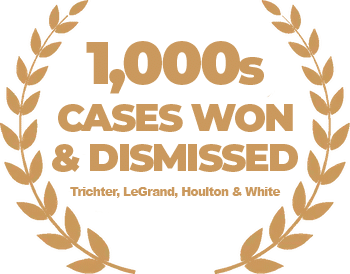
- HOME
- DWI
- What Is A DWI Specialist
- Arrested For DWI?
- DWI 2nd Offense
- DWI 3rd Offense
- Penalties For DWI
- Prior DWI Convictions
- DWI (Driving While Intoxicated)
- DUI (Driving Under The Influence)
- Drunk Driving Lawyer
- .08 Alcohol Concentration
- Felony DWI
- DWI with Child
- Intoxication Assault
- Intoxication Manslaughter
- DWI with CDL
- DWI Expunction
- Drivers License Suspension & ALR
- Impaired Driving vs Drunk Driving
- DWI & Gun Ownership
- Public Intoxication
- BWI (Boating While Intoxicated)
- FWI (Flying While Intoxicated)
- Drug Possession
- AVIATION
- REVIEWS
- PAYMENTS
- INFO
- ABOUT
- About Us
- DWI Specialist J. Gary Trichter
- DWI Lawyer Leslie LeGrand
- DWI Lawyer Aaron White
- DWI Lawyer Gregory Houlton
- Of Counsel Attorneys
- CONTACT
- HOME
- DWI
- What Is A DWI Specialist
- Arrested For DWI?
- DWI 2nd Offense
- DWI 3rd Offense
- Penalties For DWI
- Prior DWI Convictions
- DWI (Driving While Intoxicated)
- DUI (Driving Under The Influence)
- Drunk Driving Lawyer
- .08 Alcohol Concentration
- Felony DWI
- DWI with Child
- Intoxication Assault
- Intoxication Manslaughter
- DWI with CDL
- DWI Expunction
- Drivers License Suspension & ALR
- Impaired Driving vs Drunk Driving
- DWI & Gun Ownership
- Public Intoxication
- BWI (Boating While Intoxicated)
- FWI (Flying While Intoxicated)
- Drug Possession
- AVIATION
- REVIEWS
- PAYMENTS
- INFO
- ABOUT
- About Us
- DWI Specialist J. Gary Trichter
- DWI Lawyer Leslie LeGrand
- DWI Lawyer Aaron White
- DWI Lawyer Gregory Houlton
- Of Counsel Attorneys
- CONTACT
WHAT IS A DWI THIRD OFFENSE?
According to the State of Texas, a DWI Third Offense is when an individual is arrested or charged for DWI with two prior convictions of DWI on their record. A serious offense, DWI Third can be considered a third-degree felony, which may result in severe punishment.
Punishment may include:
- A fine of up to $10,000
- Between 2 and 10 years in the Texas Department of Criminal Justice
- A suspension of your driver’s license for 180 days to 2 years
- Mandated annual $1,500 to $2,000 surcharge fee for 3 years in order to retain your driver’s license
- Disqualification from voting or possessing a firearm
If you are currently facing charges for DWI Third, you should consider seeing legal counsel from a professional DWI defense attorney with experience handling DWI, DWI Second, and DWI Third cases. The severity of DWI Third charges can vary based on circumstance and court proceedings, but in all cases it is a serious matter that may benefit from the aid of legal counsel.
GET A FREE CONSULTATION
Why you should aggressively fight a first or second DWI offense
DWI Third Offense cases are complicated and weighted, similar to their DWI Second counterpart. Juries will be informed from the beginning that the driver has a prior DWI conviction, or in the case of DWI Third, multiple convictions.
Again, it suggests to juries that a driver may have ongoing habits or propensity for Driving While Intoxicated to an extreme degree. This biased provision of information may infringe upon a defendant’s right to the presumption of innocence, weighting the trial against them before it fully begins.
Due to the increasing difficulty of defending against DWI Second and DWI Third charges, it is often best to aggressively fight initial or subsequent charges in an attempt to avoid consecutive charges with escalating severity.
DWI Third Offense Limits on Probation
Even if you are granted probation for a DWI Third Offense conviction, you will be required to serve a 10 day jail sentence. If you were driving the vehicle in a manner that made it a “deadly weapon”, you will receive an additional penalty prohibiting good time credit in prison until half of your sentence has been satisfied.
Deadly weapon findings may also limit circumstances under which you may receive probation from a jury.
Vehicle Interlock Device
As a condition of bond for your DWI Third Offense, the court will require you to install a vehicle ignition interlock device on your car, and you will be prohibited from operating a motor vehicle without one.
The interlock device detects the presence of alcohol in your breath, limiting the car’s mobility if detection is positive.
The court will also order the accused to abstain from alcohol use and the use of controlled substances without a prescription.
The court may enforce this by ordering random drug testing.
Further Consequences
The court will also order you to stop using alcohol and controlled substances without a prescription, which will be enforced through random drug testing. You may also be asked to completely abstain from operating a motor vehicle while your case is pending.
Prior Convictions and DWI
The prosecution can use offenses, including prior DWI convictions, from anywhere from 10 to 30 years ago to enhance your current DWI conviction. Such a history increases the grade of the DWI offense you are presently being prosecuted for, which also increases the range of punishments available to the state and the consequences of the current charge.
However, if you were convicted of a DWI prior to January 1, 1984, it cannot be used for enhancement purposes where the sentence resulted in probation that was never revoked.
Additional Considerations and Defense
The judgement must have a proper voluntary waiver of jury trail in order to be used to enhance a DWI to a felony DWI. For a potential felony case or for any DWI and DWI escalation charge or conviction, working with a DWI attorney can help you better understand your rights, position, and any potential defense while you are being prosecuted for a DWI Second or DWI Third.
As mentioned earlier, the bias and increasing difficulty of a DWI Third charge is not to be taken lightly, and as such, legal counsel should be considered early in the process to more fully prepare you for legal proceedings surrounding your case.
Reviews
TELL US ABOUT YOUR CASE
Form Submissions have a fast response time. Request your free consultation to discuss your case with one of our attorneys over the phone. The use of this form does not establish an attorney-client relationship.
The information on this website is for general information purposes only. Nothing on this site should be taken as legal advice for any individual case or situation. This information is not intended to create, and receipt or viewing does not constitute, an attorney-client relationship.


